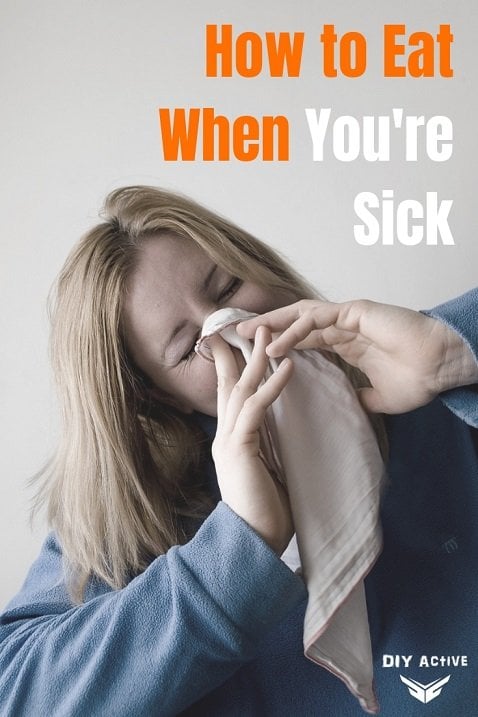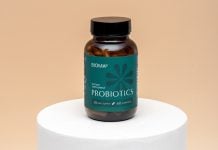
This post may contain affiliate content from which we earn a small commission at no additional cost to you. Read our full disclosure.
Nutrition 101: How to eat when you’re sick
No one likes being sick. Most people try to actively avoid illness at all costs, especially when someone in their household starts to sniffle. Even if you’re careful about taking your vitamins and washing your hands, however, you might still get sick occasionally.
Should you eat when you’re sick?
Adults catch about two to three colds per year, and kids get sick even more often. If you’re sick despite your preventative measures, you likely want to get better as soon as humanly possible.
When dealing with the common cold or another mild illness, the best thing you can do is give your body the support it needs to recover.
When you’re sick, you may not feel like thinking about nutrition, let alone anything else.
Even so, eating well could help your body get well faster. Here’s everything you need to know about eating when you’re sick.
How Should You Eat When Sick?
Perhaps the most important thing to remember when sick is that your body needs the energy to recover.
When the body fights a cold, it requires extra calories to continue working. Likewise, when you’re sick with a fever, you’re body uses more calories to raise body temperature — you need to replace these calories for your body to keep fighting infection. In short, you need to eat regardless of what you’ve contracted.
Even more important than eating is drinking when you’re sick, especially if your illness is causing you to lose water.
Fevers can cause you to sweat and lose water, and stomach troubles like vomiting and diarrhea could also make you dehydrated. Even if you don’t feel like eating, you need to at least drink plenty of fluids.
There’s no set rule for how much you should eat or drink when you’re sick.
To ensure you’re getting enough nutrition and water, it’s a good idea to pay close attention to your body’s signals when you start to feel a cold coming on.
Doing so means eating when you’re hungry, drinking when you’re thirsty, and noticing when you haven’t given your body anything in a while.
Basically, be extra nice to your body when you’re sick.
What Foods Should You Eat?
The kinds of foods you eat while recovering from a cold or other sicknesses will depend on your symptoms and what sounds good to you.
Some foods can help relieve different symptoms, and others may help you recover from illness faster. Here are five foods that may help you feel better.
1. Soup
You probably already know that chicken noodle soup makes for the perfect sick food. However, this home remedy actually has some scientific basis.
In addition to providing fluids, calories, protein, and other nutrients, chicken soup may have mild anti-inflammatory properties, allowing it to soothe upper respiratory tract infections.
Furthermore, the hot steam from the soup naturally opens up the sinuses and may help with a stuffy nose.
Vegetarians may find similar effects by eating a hot vegetable-broth-based soup instead.
2. Yogurt
Plain yogurt can help lessen nausea, so it’s a good food to eat when you’re sick with an upset stomach.
Furthermore, yogurt rich in probiotics — healthy bacteria — may actually help you recover from a cold faster.
 Research has shown that children and adults taking probiotics recovered about a day faster than those who took a placebo, so eating yogurt could shorten the length of a cold.
Research has shown that children and adults taking probiotics recovered about a day faster than those who took a placebo, so eating yogurt could shorten the length of a cold.
Remember, though, that dairy may lead to a feeling of worse congestion, so you may want to search for another source of probiotics if you’re congested.
3. Honey
Honey has a number of health benefits, including the ability to soothe a cough. One study found that honey soothed children’s coughs more effectively than some common cough medicines.
So, honey might make a good cough suppressant, though you shouldn’t give honey to children under 12 months old.
Honey also has antibacterial and anti-inflammatory properties, which can help soothe a sore throat. You can eat a plain spoonful of honey or mix it into tea or warm water.
4. Oatmeal
Oatmeal is good sick food because it provides calories, fiber, and protein while being bland enough for a sick person to stomach easily.
For extra health benefits, consider adding dried or fresh fruit, honey, or a handful of nuts.
5. Fruits and Berries
Many fruits and berries contain vitamins and antioxidants that help support a strong immune system.
Blueberries, for example, may boost the respiratory tract’s immune response, helping you prevent or recover from a cold.
You can give your immune system the support it needs by eating fruits like oranges, kiwis, pomegranates, strawberries, and blueberries. Plus, these foods are delicious!
Wrap-Up: Eat Well and Feel Better
When you’re sick, you may not feel like eating much.
However, eating well can help you recover from a cold faster.
Consult your doctor and then give your body the energy it needs to fight illness by eating regularly, resting, drinking plenty of fluids, and trying some of these sickness-fighting superfoods.
By treating your recovering body with kindness, you can feel better as soon as possible.
- Goal Setting: Why Are Goals Important? - January 22, 2024
- 10 Tips for a DIY Healthy Spring Picnic - April 24, 2021
- Be a Winter Champion With These Winter Health Tips - October 26, 2020
Disclosure: In the spirit of full disclosure, DIYactive.com may be compensated in exchange for featured placement of certain reviews or links on this website. View our full disclosure.



